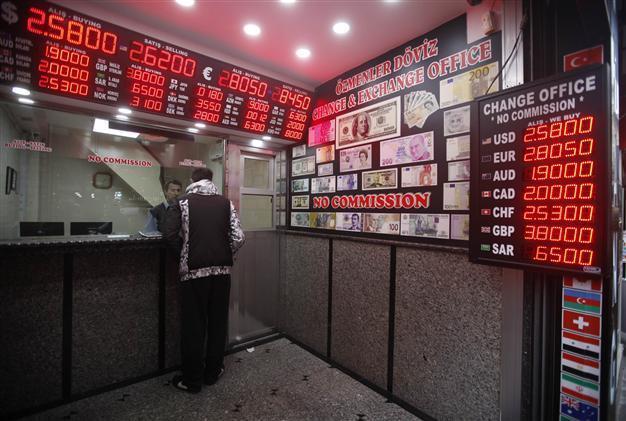Central Bank struggles to recover lira from historic lows
ANKARA/ISTANBUL

REUTERS Photo
Turkey’s Central Bank has taken a number of measures to defend the Turkish Lira, but did little to recover it off record lows, outweighed by a globally strong U.S. dollar and concerns about political actors’ intervention in economic policy.
The Bank said it would adjust its reserve requirements, which are to control the amount of dollars in the market, to temporarily boost forex liquidity by some $1.5 billion over the coming weeks.
The lira weakened to 2.6455 against the dollar March 10 afternoon, just near the new record low set on March 6, as expectations of a U.S. interest rate hike pushed the dollar to multi-year highs.
The prospect of rising U.S. yields threatened to draw funds away from emerging markets, causing strains from Brazil to Turkey and South Africa. The Brazilian real led the rout, having fallen for the sixth straight session, according to Reuters data.
The lira has fallen around 12 percent against the dollar this year and was the worst-performing emerging market currency against the dollar March 10, according to Reuters data.
Turkey’s domestic politics have also played a key role in the recent loss of the lira against the greenback, as well as severe fluctuations in global markets amid the rise in the value of the U.S. dollar.
The loss in the lira’s value has been exacerbated by the demands of President Recep Tayyip Erdoğan and several ministers for sharp interest rate cuts to boost growth ahead of a June election.
“In this environment, countries don’t need to give investors any excuse to sell,” said Timothy Ash, head of emerging markets research at Standard Bank in London, as quoted by Reuters.
“In Turkey’s case, we have an administration that thinks it is cleverer than everyone else, and the market ... Turkey needs to get back to plain vanilla policy [and] the government needs to back off from the Central Bank,” he wrote in a note.
There is, yet, little immediate sign of that happening.
Economy Minister Nihat Zeybekci, one of the cabinet’s most vocal critics of the Central Bank, said early March 10 the Bank should have cut interest rates before its last meeting in late February.
“We cannot say the Turkish Lira has lost value against the U.S. dollar [given] the overvaluation of the dollar against all currencies. I, therefore, see it as unnecessary for the Central Bank to intervene on the lira,” he said.
“I just believe there are many things to do with the rates and it is my right to say this as the economy minister. Turkey needs to grow by 5 percent and more on average annually,” he said.
Central Bank Governor Erdem Başçı will brief Erdoğan today on the latest developments, and was in a meeting with Prime Minister Ahmet Davutoğlu and nine cabinet ministers.
Before the ministerial meeting, Davutoğlu said there was no communication problem between the Central Bank and the government.
“We’ll take the necessary steps in full coordination as we did before,” he said at the parliamentary group meeting of his party March 10.
The dollar has been dramatically increasing against all currencies and the world is now in an economic crisis, Davutoğlu said.
“Turkey’s economic indicators are one of the world’s healthiest indicators. Our budget is robust, public debts are quite low and the banking sector is strong, so nobody should seek for any economic crisis here,” he said.
Davutoğlu also said the country has been growing below expectations, but above the world average.
“We just need to grow faster,” he said.
The head of the main opposition Republican People’s Party (CHP), Kemal Kılıçdaroğlu, harshly criticized Davutoğlu’s words.
“The government kept saying that the Turkish economy was quite strong two years ago. If the economy was that strong, why did it become one of the five most fragile economies in the world just one day after the Fed had announced to end the high liquidity party in 2013…? The lira has lost value by 11.5 percent since the beginning of the year, one of the biggest losers,” Kılıçdaroğlu said at his party’s group meeting March 10.
Turkish equities were among the worst emerging markets performers, with the main index ending the day down 3.31 percent at 77,977.48 points, compared with a 1.49 percent fall across emerging markets.
The cost of insuring exposure to Turkish debt rose to 11-month highs, with Turkey’s five-year credit default swaps (CDS) rising by 227 basis points, bankers told to Reuters.
